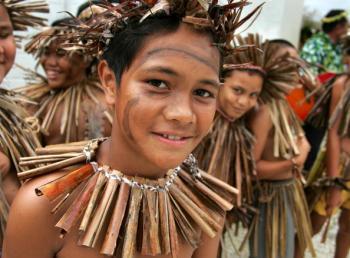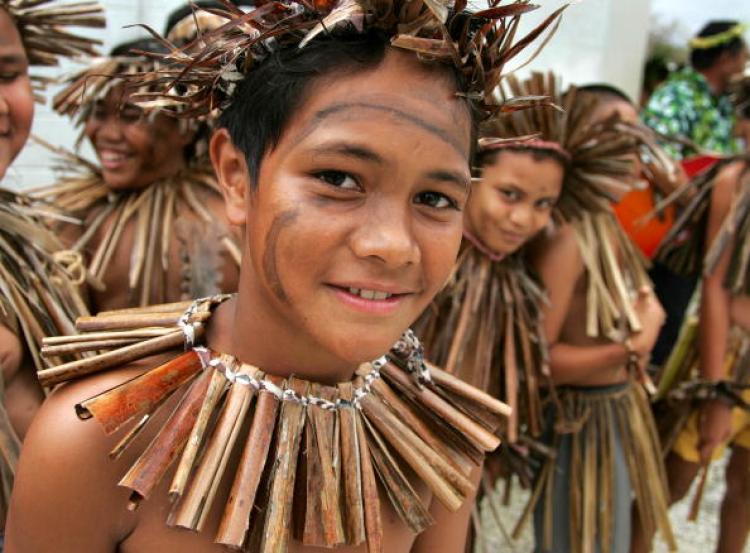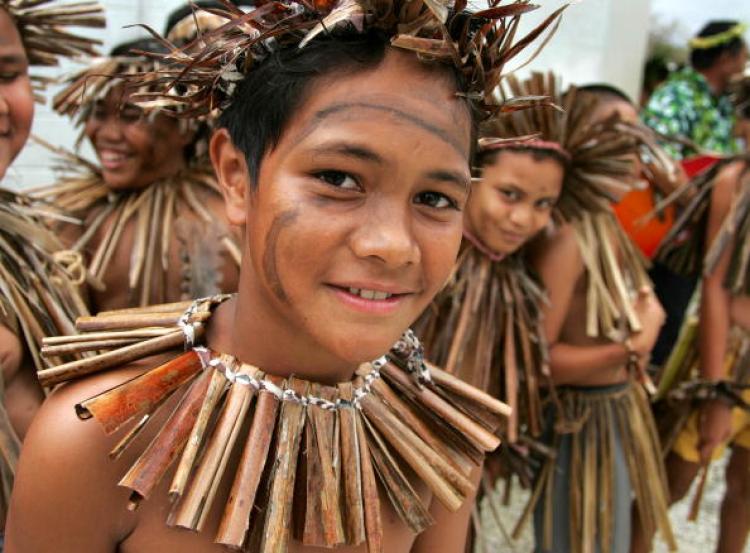The meeting of leaders from 15 Pacific nations at the Pacific Island Forum in the tiny island nation of Niue will mark a new era in Australia’s involvement in the region, says Queensland academic Dr Max Qanchi.
Dr Qanchi, a specialist in the Pacific at Queensland’s University of Technology, said Australia’s interest in the region had declined over the last decade, but the Rudd Government had made it clear that the Pacific was now a priority.
“The Pacific is still relatively small to our other engagements, but the current Government has elevated it up to being one of the things it is most concerned with and I think that is a good sign for Australia,” Dr Qanchi told The Epoch Times.
“It is about time we recognised our role in the region and our closest neighbours.”
The Pacific Island Forum, the 39th to take place since its inception in 1971, originally consisted of seven members – Australia, the Cook Islands, Fiji, Nauru, New Zealand, Tonga and Western Samoa.
The founding member countries have since been joined by Niue, Papua New Guinea, Kiribati, Tuvalu, Vanuatu, Solomon Islands, Republic of the Marshall Islands, the Federated States of Micronesia and Palau, bringing the total to 16.
Fij’s self-appointed Prime Minister Commodore Voreque Bainimarama, however, has declined to attend the forum.
The Commodore promised forum leaders last year that he would hold elections in March 2009 after seizing power in a bloodless coup, but has since reneged on his agreement.
Prime Minister Kevin Rudd has expressed disdain for the Commodore’s behaviour, the ABC reported.
“We, in the South Pacific and Pacific Island countries, in particular take democracy seriously,” he said.
Mr Rudd said the failure to attend was offensive to other forum members and that the issue of Fiji would be addressed at the forum.
“Bainimarama’s contempt for regional leaders such as the grand chief of Papua New Guinea, Sir Michael Somare, on this question have to be taken into account and I think it’s going to turn into a very interesting discussion in Niue in terms of this decision not to attend,” he said.
Meanwhile, Mr Rudd has assured his attendance will be welcome with the formal announcement of a Pacific Island Seasonal Workers Scheme.
The Australian Government flagged the pilot programme earlier in the week stating that it will allow up to 2500 workers from Kirribati, Tonga, Vanuatu and Papua New Guinea to work in the horticultural sector in Australia.
Dr Qanchi said the scheme was a benchmark and long overdue. It marked a change in tone from the previous Howard Government, he said, which had focused too much on the big players to the detriment of the region.
Kevin Rudd outlined his Government’s vision for an invigorated regional relationship on his first visit to Papua New Guinea as Prime Minister in March this year.
“We are carving out a new chapter in the relationship between Australia and Papua New Guinea. We are carving out a new framework for our relationship with the rest of the Pacific island countries,” he said.
Under the Port Moresby Declaration, Mr Rudd promised big funding increases in education and training opportunities, including a significant programme of scholarships for Pacific islanders to study in Australian educational institutions.
He also said Australia will work closely with islands nations to help them meet the United Nations Millennium Development Goals adopted by the United Nations in 2000.
Dr Qanchi said that a decade ago, Australia was considered a leading nation on research and scholarship in the Pacific. However, with little attention, the number of specialists had declined.
Pacific students had accordingly drifted to other nations for scholarships and study, particularly China, Japan and America. “Now we need to get this back up again,” he said.
However, the Rudd Government’s increasing focus on the region was already showing signs of improvement in this area, Dr Qanchi said, citing as examples the resumption, after 10 years, of the Port Moresby ideas fest, the Waigani Seminars and the formation of a new Australian–Pacific focused association, Australian Association for the Advancement of Pacific Studies.
The association has over 300 members to date, he explained, and was looking to involve artists, museums, art galleries, institutions and other non-government organisations.
“They are the sort of informal links we need to generate again,” he said.
Dr Qanchi, a specialist in the Pacific at Queensland’s University of Technology, said Australia’s interest in the region had declined over the last decade, but the Rudd Government had made it clear that the Pacific was now a priority.
“The Pacific is still relatively small to our other engagements, but the current Government has elevated it up to being one of the things it is most concerned with and I think that is a good sign for Australia,” Dr Qanchi told The Epoch Times.
“It is about time we recognised our role in the region and our closest neighbours.”
The Pacific Island Forum, the 39th to take place since its inception in 1971, originally consisted of seven members – Australia, the Cook Islands, Fiji, Nauru, New Zealand, Tonga and Western Samoa.
The founding member countries have since been joined by Niue, Papua New Guinea, Kiribati, Tuvalu, Vanuatu, Solomon Islands, Republic of the Marshall Islands, the Federated States of Micronesia and Palau, bringing the total to 16.
Fij’s self-appointed Prime Minister Commodore Voreque Bainimarama, however, has declined to attend the forum.
The Commodore promised forum leaders last year that he would hold elections in March 2009 after seizing power in a bloodless coup, but has since reneged on his agreement.
Prime Minister Kevin Rudd has expressed disdain for the Commodore’s behaviour, the ABC reported.
“We, in the South Pacific and Pacific Island countries, in particular take democracy seriously,” he said.
Mr Rudd said the failure to attend was offensive to other forum members and that the issue of Fiji would be addressed at the forum.
“Bainimarama’s contempt for regional leaders such as the grand chief of Papua New Guinea, Sir Michael Somare, on this question have to be taken into account and I think it’s going to turn into a very interesting discussion in Niue in terms of this decision not to attend,” he said.
Meanwhile, Mr Rudd has assured his attendance will be welcome with the formal announcement of a Pacific Island Seasonal Workers Scheme.
The Australian Government flagged the pilot programme earlier in the week stating that it will allow up to 2500 workers from Kirribati, Tonga, Vanuatu and Papua New Guinea to work in the horticultural sector in Australia.
Dr Qanchi said the scheme was a benchmark and long overdue. It marked a change in tone from the previous Howard Government, he said, which had focused too much on the big players to the detriment of the region.
Kevin Rudd outlined his Government’s vision for an invigorated regional relationship on his first visit to Papua New Guinea as Prime Minister in March this year.
“We are carving out a new chapter in the relationship between Australia and Papua New Guinea. We are carving out a new framework for our relationship with the rest of the Pacific island countries,” he said.
Under the Port Moresby Declaration, Mr Rudd promised big funding increases in education and training opportunities, including a significant programme of scholarships for Pacific islanders to study in Australian educational institutions.
He also said Australia will work closely with islands nations to help them meet the United Nations Millennium Development Goals adopted by the United Nations in 2000.
Dr Qanchi said that a decade ago, Australia was considered a leading nation on research and scholarship in the Pacific. However, with little attention, the number of specialists had declined.
Pacific students had accordingly drifted to other nations for scholarships and study, particularly China, Japan and America. “Now we need to get this back up again,” he said.
However, the Rudd Government’s increasing focus on the region was already showing signs of improvement in this area, Dr Qanchi said, citing as examples the resumption, after 10 years, of the Port Moresby ideas fest, the Waigani Seminars and the formation of a new Australian–Pacific focused association, Australian Association for the Advancement of Pacific Studies.
The association has over 300 members to date, he explained, and was looking to involve artists, museums, art galleries, institutions and other non-government organisations.
“They are the sort of informal links we need to generate again,” he said.






